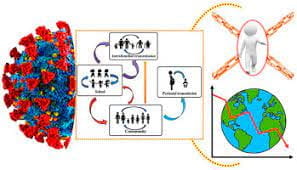Post COVID-19 Pandemic: A Reflection of the Current State of the World
Ever since the pandemic broke out in December 2019, it has increased individualism among us. The pandemic has changed the nature of our “typical” social interactions; we don’t interact with other people in-person as much anymore. Many of us would agree that video calling can be a nicer way of chatting with others because it lets us physically see and speak to anyone regardless of where they are in the world, which was especially true with the rise in loneliness during the pandemic. As Zoom dominated — and continues to dominate — the video-calling industry, we shift to it as our main form of communication with others: in-person meetings are closer to becoming obsolete essentially, as video-calling becomes the new trend in today’s developing world. And even work life, too! Take the technology industry as an example. Company leaders have witnessed a significant boost in work output as they allow their employees to work from home on a few days in the weeks, and, consequently, some have implemented hybrid-working policies.
There have been studies that show more than 90% of data generated in the world have been in the last few years. Almost every year, there are new advances in artificial intelligence (AI) like OpenAI’s language model that uses deep learning to produce human-like text, alarmingly indistinguishable deep-fake videos and images, or DeepMind’s AlphaFold AIbased algorithm that solved a 50-year old challenge in proteomics. Therefore, I have no doubt that this field will continue to grow in the coming decades. However, at the same time, the evolution of technology goes to make sure that tasks that humans could do earlier can now be achieved by machines and technology, therefore creating a shortage of jobs. And even more concerning, a rise in technology has created a dependence on our devices, tools, and processes. There’s not a requirement to think or recall information because everything is instantly available to us in a giant database, the Internet. Even a little tool, like a calculator, reduces the necessity to perform mental calculations or skills to try to do mathematics because you’ll solve equations by crunching them into the device that “magically” spits out answers/numbers. With regards to the recent COVID-19 pandemic, it caused an inevitable surge in the use of digital technologies due to the social distancing norms and nationwide lockdowns instituted in place; as such, video-conferencing platforms like Zoom were on the rise to build and maintain relationships. This embodies the commonplace of reliance on technology, as people become more reliant and overuse technology to the point where it’s unnecessary — some people are video calling their neighbors who live two minutes away from them!
Homeschooling was also on the rise with the outbreak of the pandemic. As schools were not able to provide ideal in-person instruction anymore, young children were less likely to attend Zoom lecture videos and, consequently, were not able to easily grasp concepts and fundamental ideas. Furthermore, older students like high school students and college students took advantage of the situation and, quite frankly, cheated on examinations. Essentially, the pandemic has taught us that online instruction is an unfavorable form of instruction that shouldn’t be repeated again in the future, unless absolutely necessary because of the circumstances. This embodies the commonplace of in-person instruction reigning as the most efficient form of teaching, not online instruction.
With the pandemic’s brutal waves, the US and other countries will hopefully realize in the following years that working together will help solve problems that are on a global scale. Through seeing the spread of the COVID-19 variants in the US, countries will realize that this is a global problem, not a US problem. In the coming years, we will also hopefully see more economic safety nets put in place like the COVID stimulus package that the citizens will be less stressed, more supportive, and inclusive of their communities — that’s the long-term goal!


Enjoy Reading This Article?
Here are some more articles you might like to read next: